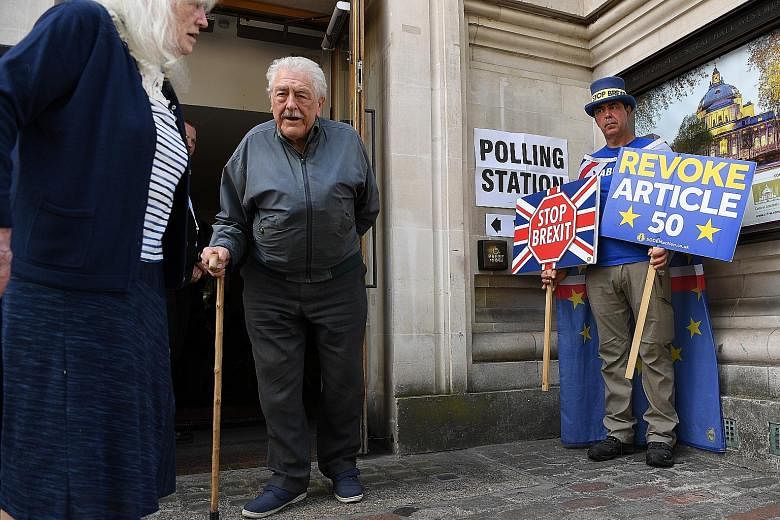LONDON • Britain went to the polls on Thursday for a bizarre election in which the party likely to win the most seats is one that would prefer not to be running at all.
Three years after Britain voted to leave the European Union, and two months after it was supposed to leave, it is participating in elections for the European Parliament, the EU's legislative body. If the polls are correct, arch-eurosceptic Nigel Farage's newly formed Brexit Party is on course to blow the competition out of the water.
Voting is staggered across the continent until this weekend, with results expected to start trickling in tomorrow night.
In the Netherlands, the Labour party of European Commissioner Frans Timmermans won a surprise victory, a Thursday exit poll showed, easily beating a eurosceptic challenger who had been topping the surveys.
On the continent, all eyes are on whether the populist, nationalist parties will do well - or whether the centre holds.
"I'm ashamed to admit I voted for the Brexit Party," said Mr Bruce Horton-Gabell, a 41-year-old lawyer, after exiting a polling station in south-west London.
He said he voted "remain" in the 2016 Brexit referendum and is normally a centrist voter - he once backed Labour prime minister Tony Blair and admires former US president Barack Obama. But Mr Horton-Gabell said a "lack of leadership" from Britain's two main parties on Brexit deterred him from voting for them.
"I was devastated when we voted to leave the EU, but, as somebody who does believe in democracy and believes in what this country can achieve, I felt it was important that we made the most of it and got on with it," he said.
This election could see both anti-Brexit and pro-European forces doing well in Britain. But the pro-European voices are scattered across several parties, including the Liberal Democrats, the Green Party and a new group called Change UK.
A recent YouGov poll had the Brexit Party at 37 per cent, Liberal Democrats at 19 per cent, Labour at 13 per cent, Green at 12 per cent and the ruling Conservatives at 7 per cent. One striking thing about the polls is how Britain's two main parties - Labour and Conservative - are barely in contention.
Anti-establishment parties have tended to finish strong in these low-turnout votes that take place every five years. In 2014, Labour and the Conservatives came in a few points behind the eurosceptic party Mr Farage was then leading. But this time, polls have his party beating their combined total.
A charismatic but divisive figure, Mr Farage is among the right-wing politicians to have been pelted with milkshakes on the campaign trail.
Like him, Mr Boris Johnson, a prominent Brexiteer and former foreign secretary who is leading in the polls to replace Mrs Theresa May as Tory leader, has downplayed risks of a "no deal" Brexit - leaving the European Union without a withdrawal agreement and transition period.
But many economists have predicted leaving with no deal could create havoc for Britain and Europe.
Labour's leader Jeremy Corbyn has been hesitant on whether his party should support a second referendum on Brexit, as many want.
Mr Brian Feltham, 82, a retired chemist, said he decided to abandon his beloved Labour and vote Liberal Democrats, because "they are the party most likely to keep us in the EU".
"It would be ridiculous if we were on our own," Mr Feltham said. "Once we were a different country, with an empire. Not anymore."
"We're much too small now," said Mr Feltham.
WASHINGTON POST, REUTERS

